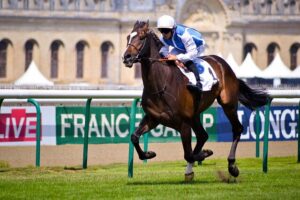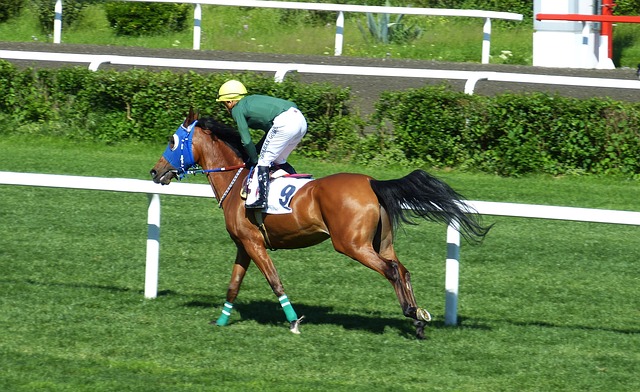 One of the things I like about horse racing is that it brings different people together. Those relationships can develop into longstanding friendships which actually add to life. There are a number of people I know who I can guarantee we wouldn’t have met or become friends if it weren’t for our passion for the Sport of Kings. Perhaps some of those friendships could be attributed to a pure love of gambling. I would say that about them rather than me, as I am more disciplined and my foundation is built on knowledge.
One of the things I like about horse racing is that it brings different people together. Those relationships can develop into longstanding friendships which actually add to life. There are a number of people I know who I can guarantee we wouldn’t have met or become friends if it weren’t for our passion for the Sport of Kings. Perhaps some of those friendships could be attributed to a pure love of gambling. I would say that about them rather than me, as I am more disciplined and my foundation is built on knowledge.
Eric is a man of knowledge too.
As I always say: “Knowledge comes before money!”
I must have met Eric 35 years ago. It was at the local bookmakers, Ladbrokes on Broad Street. I won’t mention the town in case he’d rather not be known as the man about town. However, he was certainly that in his younger years. As time has passed and age catches up with us all, he isn’t quite as sprightly as he once was.
I guess when we first met we must have been in our late teens. I say ‘we’ because my twin brother and I always come as a bit of a double act. Definitely no Cannon & Ball. While Eric was more of a Morecambe, but still wise. He used to be very sporty and loved his football, and you could tell by his physique.
I’m sure the first time I met Eric it must have been in Ladbrokes. In those days, back in the 1980s, betting shops were very much a social gathering for degenerates. I say that with a smile as I am sure Eric would have called most of the punters much worse. In truth, it was a melting pot of every kind of person. Each loved a bet. Some would be interested in horse racing, others greyhounds, and one or two coming and going quickly, placing a bet and disappearing back into town. They may have been interested in escaping the nicotine cloud that seemed ever present. Half an hour in there and anyone with a sense of smell thought you were a heavy smoker.
The windows were covered as part of the gambling regulations. The door may be open in the summer but they’d have one of those ribbon things which fluttered in the wind. I think they were used to keep the flies out and the punters in. I’d often see someone stop in their tracks, ribbons tangled around their neck.
Eric is probably the most sarcastic person I have ever met. He would be pleased to hear those words and wear them proudly like a badge. If he thought he could get the better of you, when it came to gambling, he would make your life a misery. It was all done in humour, but he would latch onto your weakest link and forever fire sarcastic remarks as if he had a machine gun. Unrelenting. To be fair, people must have half hated him. But he wasn’t so blatant that he would just go full throttle. He was high-brow sarcastic. In the sense that he would be kind of cryptic about the insult or put-down so it would go over someone’s head, but one or two in the crowd would understand it and be laughing at their expense.
I’m making Eric out to be the pantomime villain. If so, it would be one of those crude adult versions like Pissed-Up Panto: Jack And The Beanstalk. Or if he was a woman: Cinderella and the Two Ugly S!@S.
Eric must have seen my brother and me enter the bookies for the first time and said to himself: ‘I’ve got a couple of victims here!’
We have always known a lot about our niche of horse racing and as teenagers made most seasoned gamblers look pretty stupid in their lack of knowledge compared to our encyclopedic minds. Most punters have the memory span of a goldfish. They don’t even remember the name of the horse trainer, let alone much else.
Eric must have respected something we said in those early days. When it came to two-year-old horse racing, he would be on a loser trying to undermine our knowledge. To be fair, even to this day, I always say to people: ‘I have nothing to prove to anyone.’
I don’t need to, as I know more than anyone I have ever met when it comes to two-year-old horse racing. In fact, I often say to people: ‘There isn’t a question I cannot answer when it comes to our niche. That may sound big-headed, but it’s not meant to be. I would love someone to have a strong opinion or a question which makes me consider. To get away from the clichés and find originality. It’s a rare concept in the racing world. I have spent a lifetime thinking about questions and answers. Those answers lead to more questions. I don’t know everything and believe we can learn from everyone. Often the most naive people have the best questions. They often listen to the answers, too.
Anyway, some three-plus decades later we still meet with Eric to chat about racing, gambling, a list of ailments, and a cup of coffee and tea.
A couple of hours every month or so.
Eric is one of those people you will never forget. A chatterbox. But someone who loves to talk about every method you could imagine to make your betting pay. He is a systems man. A football and horse racing fanatic. Whether backing or laying, he just loves to get stuck into his data.
In fact, there is only one thing he loves more than gambling and that’s some poor unfortunate gambler who is a little wet behind the ears.
He’ll soon thicken their skin.
That’s if they realize his higher level of sarcasm.
 Raised in Killarney, Co. Kerry, Oisin Murphy is the nephew of Cheltenham Gold Cup winning jockey Jim Culloty. A graduate from the pony racing circuit, he became apprenticed to Andrew Balding in October, 2012, at the age of 17. In his first full season, Murphy rode 41 winners, including a four-timer on Ayr Gold Cup Day, which brought him to the attention of the wider racing public.
Raised in Killarney, Co. Kerry, Oisin Murphy is the nephew of Cheltenham Gold Cup winning jockey Jim Culloty. A graduate from the pony racing circuit, he became apprenticed to Andrew Balding in October, 2012, at the age of 17. In his first full season, Murphy rode 41 winners, including a four-timer on Ayr Gold Cup Day, which brought him to the attention of the wider racing public. In a world of social media the influencer in king.
In a world of social media the influencer in king. One of the things I like about horse racing is that it brings different people together. Those relationships can develop into longstanding friendships which actually add to life. There are a number of people I know who I can guarantee we wouldn’t have met or become friends if it weren’t for our passion for the Sport of Kings. Perhaps some of those friendships could be attributed to a pure love of gambling. I would say that about them rather than me, as I am more disciplined and my foundation is built on knowledge.
One of the things I like about horse racing is that it brings different people together. Those relationships can develop into longstanding friendships which actually add to life. There are a number of people I know who I can guarantee we wouldn’t have met or become friends if it weren’t for our passion for the Sport of Kings. Perhaps some of those friendships could be attributed to a pure love of gambling. I would say that about them rather than me, as I am more disciplined and my foundation is built on knowledge.